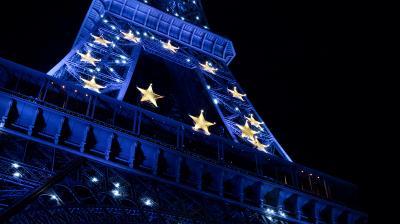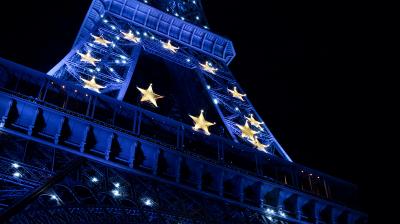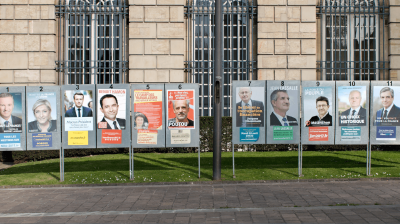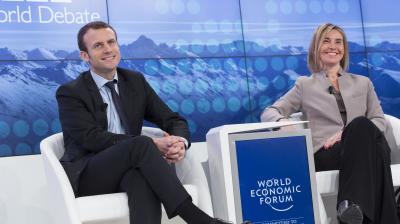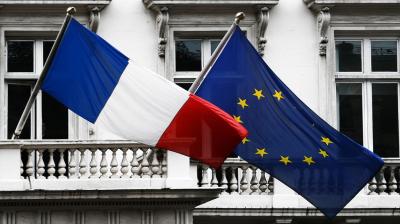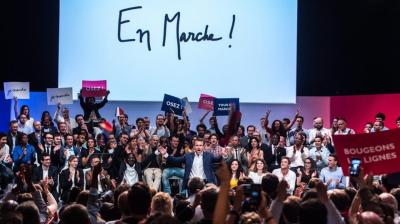
Since the end of the 1970s, when labour migration was halted, immigration has been the hot potato of French politics. Ever since its electoral breakthrough in 1982, the Front National has capitalized on the anxieties of the French society towards globalization, the economic and financial crisis as well as the disappointment with the current European project, seen by many as a big liberal market where social safety nets are being dismantled. The French political elite as a whole has been complicit of Front National’s strategy. Identity, citizenship, French suburbs and laïcité are seen by right-wing politicians as republican symbols under threat by immigrants, and this view is increasingly shared by left-wing politicians like ex-Prime Minister Manuel Valls. Immigration is therefore mostly considered as a security issue by French politicians. In the current campaign, the right-wing is copying Marine Le Pen’s programme on immigration, in the hope to attract its electorate. The far-left presents the most humanistic ideas, although outside of EU treaties, while Emmanuel Macron stresses that asylum is a right and migrants are a strength for the economy.
With 74,468 asylum applicants in 2015, France is far from the 722,000 applications received by Germany in 2016. The dismantlement of the Calais camp in October 2016 and the increasing presence of homeless refugees in the streets of Paris have nonetheless led to a renewed debate regarding the oft-cited phrase of belated Socialist Prime Minister Michel Rocard that “France cannot welcome all the misery of the world.” The 2015 Charlie Hebdo and Bataclan attacks have stressed the fracture between French society and the children of foreign-born immigrants, often in rupture with their families.
In the campaign immigration is no longer debated as a societal project but rather as a security and identity issue
Although employment remains the first preoccupation of French people, the 2017 presidential elections polls show restrictive trends towards immigration. Accordingly, 61% of the French people are in favour of suspending immigration from Muslim countries, that is above the average of 55% of Europeans. In 2016, 57% of the French thought there were too many immigrants in France and 63% were of the opinion that the majority of refugees will not be able to integrate. While Front National and the right-wing parties follow these public opinion trends, Emmanuel Macron, the leader of En Marche!, offers a more liberal approach, in line with European commitments. Jean-Luc Mélenchon, the far-left candidate, offers the most human policy, but outside of the European Treaties. Overall, in the French presidential campaign immigration is no longer debated as a societal project but rather as a security and identity issue.
The legacy of the Hollande Presidency
Traditionally known for its humanist approach to immigration, the left-wing government of President Hollande has in fact continued the security approach initiated by his predecessor Sarkozy. Hollande’s mandate started with the Leonarda affair, regarding an irregular immigrant Roma schoolgirl arrested during her school trip and returned back to Kosovo where her family had been expulsed to earlier. Later, he dropped his promise to grant foreigners the right to vote in local elections. In spite of a multi-annual residence permit, the 2014 immigration law facilitates the expulsion of irregular migrants and has been denounced by several NGOs. The 2015 asylum law reduces the delays in the treatment of asylum applications, thus aligning it with EU law. According to the OFPRA, the agency that processes asylum-seeker applications, this delay amounted to 205 days in 2014. Furthermore, asylum seekers whose request for asylum has been refused but cannot be returned to their home countries have not being given any status (see here).
Restrictive (extreme)right-wing programmes
François Fillon, ex-Prime Minister of France under President Sarkozy, and now running for president while under formal investigation for misuse of public funds and fake employment of his wife as a parliamentary assistant, offers a restrictive immigration programme, close to the propositions of Front National. With Fillon as president, the French Constitution would be modified to adopt a quota principle, to be defined by law, on how many residency permits could be delivered. Family reunification would be made harder and, borrowing from the extreme-right lexicon, France’s ‘migratory sovereignty’ would be restored through the renegotiation of European directives. Laws granting French citizenship to French ascendants of more than 65 years old would be repealed.
In Fillon’s vision, immigration should no longer be a burden to French society and he plans to provide family and accommodation allowances only to those residing in France for 2 years or more. State medical help for foreigners will be reviewed, and foreigners will be exempted from paying healthcare costs only in the cases of minors, emergencies and infectious disease, and only in some selected hospitals and clinics. Like Macron, Fillon wants to limit the delays in processing asylum requests to 4 months. Administrative detention of irregular migration will be extended from 45 days to 6 months, the maximum authorized by the EU return directive. The Schengen Treaty will be renegotiated to authorize increased controls at internal borders. Citizenship rules will be tightened up with additional conditions such as a minimum 8 years of residency in France and a minimum 5 years of marriage.
With Marine Le Pen as President legal migration will be reduced from 200,000 to 10,000 entries a year
Stopping ‘uncontrolled’ immigration is the selling slogan of the extreme-right candidate Marine Le Pen. Like Fillon Le Pen is under investigation; in Le Pen’s case regarding misuse of European Parliament funds to pay her parliamentary assistants. In her programme, the Front National leader will give ‘national preference’ to French people over what she sees as two evils: globalization and Islam. First, legal migration will be reduced from 200,000 to 10,000 entries per year. In the short term, because she wants to renegotiate the EU treaties, this should not apply to European citizens. Family reunification will also stop. Third, she will suppress the jus soli, the right of place of birth. This right grants French citizenship to anyone born on French territory with at least one French parent. Children born from foreign parents on French territory can also choose for French citizenship when they are 18 years old. State medical help would be suppressed. Fourth, internal borders will be re-established, as France will withdraw from ‘Schengen’. The regularization or naturalization of irregular migrants will no longer be possible.
Pro-immigration programmes
Benoît Hamon, the Socialist candidate supported by Europe Environment Les Verts, the Green party, takes a more liberal stance on immigration. He wants foreigners to have a right to vote in local elections and will accelerate the integration of asylum seekers. They will have the right to work after three months on French territory and will gain more opportunities to learn French. At the EU level, Hamon wants to stop the Dublin system that he considers unfair to Italy and Greece, two countries under important budgetary restrictions. Instead, he proposes a fairer sharing of asylum seekers among EU member states based on their hosting capacities.
Jean-Luc Mélenchon, the far-left leader, proposes to regularize irregular migrants and to de-criminalize irregular migration. At EU level, Mélenchon wants to replace the European Border and Coast Guard Agency by an agency that will mainly rescue migrants at sea, revise databases on foreigners and biometrics used on the external EU borders. He wants to pursue Euro-Mediterranean cooperation and co-development with Southern and African neighbours. The OFPRA would be attached to the Ministry of Foreign Affairs and no longer to the Interior Ministry, while asylum seekers would be able to work when awaiting their case to be examined. Access to French citizenship would be facilitated.
Emmanuel Macron as President will introduce ‘talent visas’ to attract the best professionals to France
Emmanuel Macron, the election frontrunner with 26% of voting intentions according to a BVA poll of 25 March 2017, has praised German Chancellor Merkel for her open-door policy. Defending a liberal immigration policy, he considers the welcoming of refugees as a moral duty for France and Europe and has therefore criticized the EU-Turkey deal. His programme develops the following main propositions. First, foreigners’ integration will be improved through offering better facilities for learning the French language and the development of local integration programmes. Second, as Macron considers immigrants as formidable assets for the French and European economies, he wants to speed up the asylum-request process and reduce it to less than 6 months, appeal included.[1] He will introduce ‘talent visas’ to attract the best professionals to France and wants to simplify access to the labour market for all students who have obtained a master’s degree in France. However, Macron does propose an immediate return to the country of origin for those who will not be granted asylum status. At the European level, he proposes to strengthen the European Border Guards Corps, to improve border control in countries of origin and to combat human smuggling, in line with existing commitments.
Looking forward
This campaign has defied any standards about French presidential elections. Notwithstanding the investigations of Marine Le Pen and François Fillon, and the fact that this election takes place under a state of emergency, the two frontrunners include a candidate who claims to be neither left-wing nor right-wing and who until a year ago did not have a party, and an extreme-right candidate whose accession to power no longer shocks anyone. Even if Front National were not to win this election, its presence in the second round would be a strong signal that Marine Le Pen’s propositions are seducing at least one third of the French citizens, and that the threat of the extreme-right is still hanging over France. Given that France is a multicultural society, built on migration, it is disappointing that migration is not regarded as a societal project. Measures to integrate migrants are minimal and it is only very rarely that candidates recall that asylum is a human right. This national disillusionment is also reflected at the European level, where migration is rarely presented as a positive force for European economies in light of the inevitable ageing of populations. This is no good news for immigrants, nor for French and European citizens.
Sarah Wolff @drsarahwolff is Lecturer at Queen Mary University of London and Senior Associate Research Fellow at the Netherlands Institute for International Relations. She is an expert on EU immigration policy. Dr. Wolff can be followed on her blog.
This article is published with the support of the Adessium Foundation.


